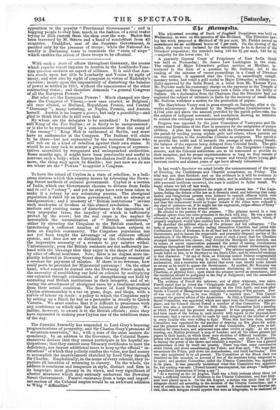With such a state of affairs throughout Germany, the course
'which popular report imputes to Austria in the Lombardo-Vene- tian question assumes an aspect of silliness. It is said that Aus- tria stands upon her title to Lombardy and Venice by right of treaty, and now also by right of conquest in virtue of Radetzky's victories ; insists upon the impossibility of disturbing the balance of power as settled in 1815, without the concurrence of the other contracting states ; and therefore demands "a general Congress of all the European Powers."
But what are the European Powers? Much changed are they since the Congress of Vienna,—new ones created, as Belgium ; old ones altered, as Holland, Republican France, and Central "Germany "; many tottering, as Naples, Prussia, and Austria herself. Austria is no longer a power, but only a possibility—and glad to think that she is still even that. By whom are the delegates to be accredited ? Is Ferdinand still King of the Two Sicilies ; or is Sicily to be unrepresented ; or is she to be represented by a commissioner from the camp of "the enemy " ? King Mob is enthroned at Berlin, and must have an ambassador at the Congress. The Italians will claim to be there—but not represented by the recreant Princes who still rub on in a kind of rebellion against their own states. It would be no easy task to muster a general Congress of represen- tatives accredited by recognized and unimpeached authorities. Some months ago, it might have been practicable and useful to convene such a body; when Europe has shaken itself down a little more, the thing may again be feasible; but jest now we do not see where are the " Powers " to appoint a Congress.


























 Previous page
Previous page